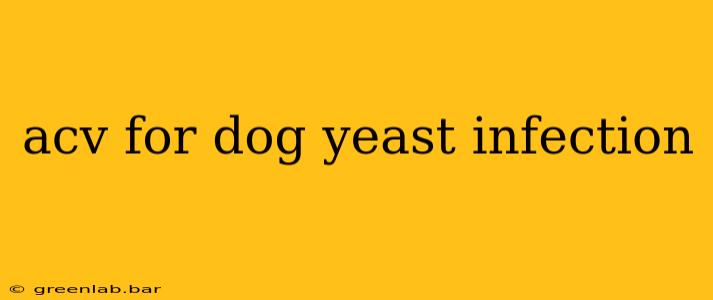Yeast infections are a common problem for dogs, causing discomfort and skin irritation. Many pet owners explore natural remedies, and apple cider vinegar (ACV) is often touted as a potential solution. But does it actually work, and is it safe for your furry friend? Let's delve into the facts.
Understanding Canine Yeast Infections
Before discussing ACV, it's crucial to understand what causes yeast infections in dogs. Yeast, specifically Malassezia pachydermatis, is a naturally occurring fungus on a dog's skin. However, an overgrowth of this yeast leads to infection. This overgrowth can stem from various factors, including:
- Underlying health conditions: Allergies, hormonal imbalances, and weakened immune systems can contribute to yeast overgrowth.
- Environmental factors: Excessive moisture, humidity, and lack of proper grooming can create a breeding ground for yeast.
- Antibiotic use: Antibiotics can disrupt the natural balance of bacteria and yeast on the skin, potentially leading to a yeast overgrowth.
Symptoms of a yeast infection in dogs can include:
- Itchy, red skin: Often accompanied by excessive licking, scratching, and chewing.
- Foul odor: A yeasty or musty smell emanating from the affected area.
- Skin discoloration: The skin may appear darker or reddened.
- Hair loss: In severe cases, hair loss may occur in the affected area.
- Ear infections: Yeast infections frequently affect the ears, leading to ear discharge and head shaking.
Important Note: If you suspect your dog has a yeast infection, always consult your veterinarian. They can properly diagnose the condition and rule out other potential issues. Self-treating can delay proper treatment and potentially worsen the infection.
Apple Cider Vinegar for Yeast Infections: Fact vs. Fiction
ACV's purported benefits stem from its acidity, which is believed to create an unfavorable environment for yeast growth. While some anecdotal evidence suggests ACV can help alleviate mild yeast infections, scientific evidence supporting its effectiveness is limited.
Potential Benefits (Anecdotal):
- Antimicrobial properties: ACV's acidity may inhibit the growth of some microorganisms, including yeast.
- Soothes irritated skin: Diluted ACV can act as a mild astringent, potentially soothing irritated skin.
Important Considerations:
- Dilution is crucial: Undiluted ACV can be highly irritating to the skin and cause burns. Always dilute ACV with water (typically a 1:1 ratio or even more diluted).
- Allergic reactions: Some dogs may be allergic to ACV, resulting in skin irritation or other allergic reactions.
- Not a cure: ACV is not a substitute for veterinary treatment. It may offer temporary relief but won't cure a severe yeast infection.
- Ingestion: Avoid allowing your dog to ingest ACV, as it can upset their stomach.
Alternative and Veterinary Treatments
Your veterinarian may recommend various treatments depending on the severity of the infection. These may include:
- Antifungal shampoos and medications: These are often the first line of defense against yeast infections.
- Oral antifungal medications: For more severe infections, your vet may prescribe oral medication.
- Addressing underlying causes: Treating underlying allergies or other health conditions is essential for long-term management.
Conclusion: A Cautious Approach
While ACV might offer some temporary relief for mild yeast infections, it's not a guaranteed solution and should never replace veterinary care. Always consult your veterinarian before using ACV or any other home remedy on your dog. Proper diagnosis and treatment are vital to ensure your dog's comfort and health. This information is for educational purposes only and does not constitute veterinary advice. Always consult a professional for any health concerns regarding your pet.

